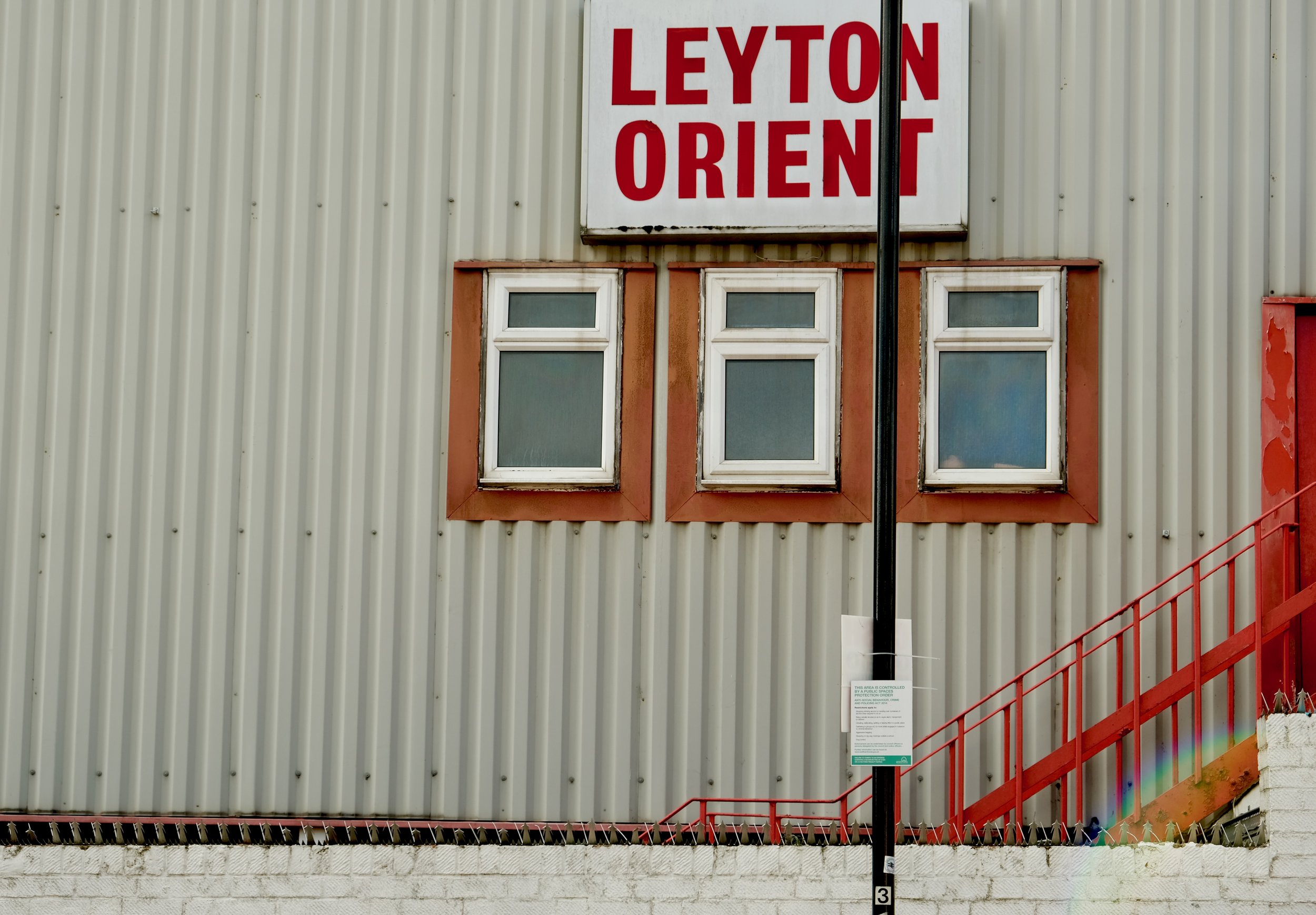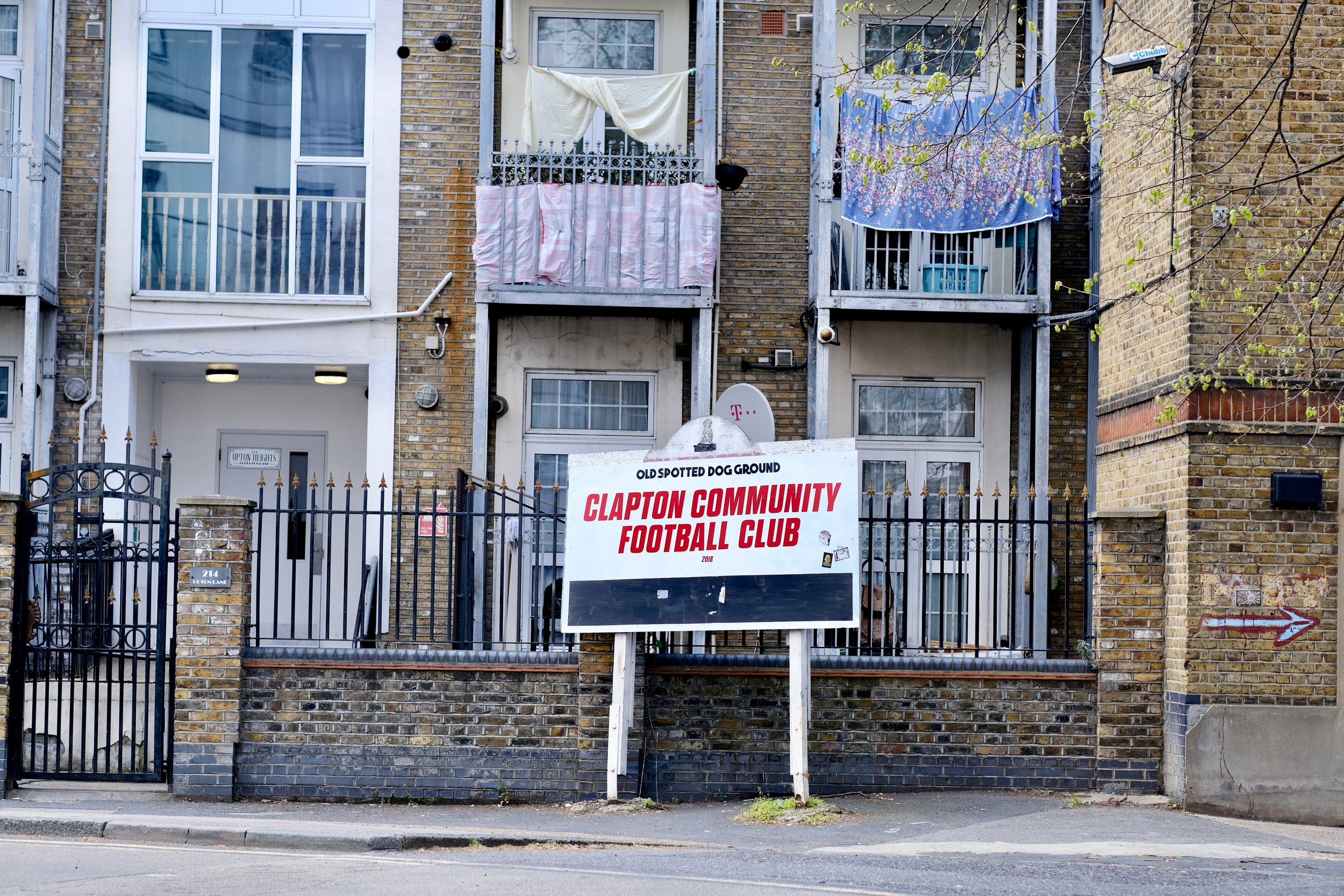Orient: Come a l0ng l0ng way baby

Words: Tom Reed
Images: Sam Wainwright/ Tom Reed where stated.
There’s a theory about cockneys; they’re not where they are supposed to be.
Simon Cooper. The Fall and Rise of Leyton Orient.
The last time I went in the home end at Leyton Orient, it was for the red rebellion against then owner Francesco Becchetti.
The O’s fans didn’t invade the pitch that day in April 2017, they reclaimed it.
Becchetti, was later convicted, in absentia, of money laundering and theft by a court in Albania.
The absence of further patience for a man who had taken the East London club from the verge of the Championship to the non-League, was more pressing for the Italian, in terms of his involvement in English football.
Becchetti shifted the club on to a consortium led by Nigel Travis in 2017 and is mainly remembered with shakes of the head and careful chewing, so as not to choke on their breakfasts, by Orient supporters in the cafes on the Leyton High Road.
©Sam Wainwright/ Terrace Edition. Leyton Orient vs Wrexham AFC. Digital.
It’s been bacon gristle to gnaw and not so many medallions to munch on for 143 year-old Orient but the supporters wouldn’t have it any other way.
There’s a smiley O, with a nifty red bowler hat, who’s polished off a couple of lattes, one of the healthy contingent of Orient fans of pensionable age who are content, that despite the rough times, they’ve got it just about right in their sporting lives.
None of the feeling of being just a number, like at nearby West Ham, who have increased the age for concessionary tickets for older fans to 66
“Orient were doing really well until World War I” says one older O, outside the Supporters’ Club at Brisbane Road”, giving away his age or at least his frame of reference.
It’s true that players of the club, then known as Clapton Orient, were the first to join up to the Footballers’ Battalion, with three players killed in action in the Great War.
©Sam Wainwright/ Terrace Edition. Leyton Orient vs Wrexham AFC. Digital.
Centre forward William Jonas, defender George Scott and star goalscorer Richard McFadden went from playing in front of 20,000 in 1915, to the Somme, from which they wouldn’t return.
There’s been a feeling of loss at the club, extending beyond the slip of various three points through fingertips.
In 2017, a supporter held up a funeral wreath in the Coronation Gardens next to Brisbane Road, fearing that his club was going to the wall.
The garden’s a lot quieter now on match-day as expectant fans hurry to the game past the statue of the most skilful player Orient ever had in Laurie Cunningham, who died young in a car crash while playing for Rayo Vallecano, aged 33.
In 2019, Justin Edinburgh, the manager who brought promotion from the seemingly inescapable National League, passed away from cardiac arrest, one of those indescribable tragedies that clubs never really get over.
©Tom Reed/ Terrace Edition. Coronation Gardens. Leyton. On film.
Maybe that’s why Orient fans are so proud of their outfit and how they came together to form some sort of way forward.
Saturday’s opponents Wrexham have the Ryan Reynolds and Rob McElhenney tweets and the TV special to finesse a sense of progress but Orient don’t have much other than a nice plate of pie, mash and liquor to bring PR sustenance.
Simon Cooper has written a book called “The Fall and Rise of Leyton Orient” which charts a lot of the tumult via two League title wins in four years and a lift in levels under the competent Richie Wellens.
He suggests that the Reynolds and McElhenney plot line at Saturday’s opponent’s Wrexham AFC, has taken column inches away from Orient’s success.
“For me, Orient’s story has even more drama than Wrexham’s. When Richie Wellens’ team won League Two, just four years after Justin Edinburgh dragged them back into the EFL, the press barely noticed because Wrexham also had a chance to get promoted.”
©Sam Wainwright/ Terrace Edition. Matthew. Leyton Orient fan from Philadelphia. Digital.
“The fact that Orient even exists is a miracle and having to cope with the tragic death of Justin Edinburgh, just weeks after regaining our league status is a unique circumstance. The past 10 years have been a rollercoaster at Brisbane Road. Disney + should make a ‘Welcome to Leyton’ next”.
Yet, Orient are better off as Thorpe Park to Wrexham’s Disney, going about their business quietly and consolidating their gains.
Funnily enough, there was an Orient fan at Brisbane Road, who hails from Philadelphia, like McElhenney, but wearing a hoodie that read “Philly supports the O’s”.
The red and white of Orient’s colours certainly complemented the scarlet of the Phillies baseball cap he was sporting and everyone know it’s always sunny in Leyton.
Meanwhile, the Leyton Engineer public house heaved, with its Italianate mosaics and chandeliers, like having a pint in a palace and Orient fans were safe in the knowledge that they weren’t to rattle around in an olympics stadium, like the mob in claret and blue who have moved in down the road.
©Tom Reed/ Terrace Edition. Leyton Orient vs Wrexham AFC. On film.
And this is where Orient need to be careful, in their pricing of tickets, which has come under the microscope of late. The banding of games into different classifications and walk up prices of up to £37 is simply not the one in a cost of living crisis.
Orient would be better off tearing up the algorithms and investing in a safe standing home end with cheap tickets, lest they end up like a Brentford-lite with various corporate add-ons and not much character.
It’s the noisy active fans, like the Orient lad with the drum, who build the atmosphere and the interest and, as a by-product, attract London’s discerning floating fans, who want to be part of something for a couple of hours but can as easily go down the road to Clapton CFC or Walthamstow FC for the craic.
There’s a hundred theatres in London to go watch a quiet Chekhov.
Leyton Orient Fans’ Trust Vice Chair Tom Davies points to ”growing concerns about ticket pricing” amongst the Orient fan-base.
Of course, the supporters “appreciate being a far more professional” outfit but Davies suggests it may well be a “false economy” to introduce classification of tickets and see prices rise towards £40 at a club that has “always presented itself as an accessible alternative to the likes of West Ham”.
©Sam Wainwright/ Terrace Edition. Leyton Orient vs Wrexham AFC. Digital.
Davies is also cautious about the possible “retaliatory” effects of premium prices for away supporters at Brisbane Road, and tit for tat inflationary rises for when the O’s travel.
On the day, it’s probably Orient’s game management which subdues their North Wales opponents rather than the cost of clicking through the turnstiles.
Wellens slowed down the runaway Wrexham mine-train by first taking the game to the away side and then soaking up pressure to bring the match to a nil-all conclusion.
During that day of red rebellion in 2017, the game was barely a few minutes old when the smoke bomb went on the pitch, the fans followed soon enough, sat down on the playing surface but weren’t in a mood to shut up.
The O’s have come a long, long way baby. There’s a long way to travel still but that’s Orient: Going where they are not supposed to be.
©Tom Reed/ Terrace Edition. Leyton Orient vs Wrexham AFC. On film.
©Tom Reed/ Terrace Edition. Leyton station. Digital.
©Tom Reed/ Terrace Edition. Leyton. On film.
©Tom Reed/ Terrace Edition. Leyton Engineer. Digital.
©Sam Wainwright/ Terrace Edition. Leyton Orient vs Wrexham AFC. Digital.
©Sam Wainwright/ Terrace Edition. Leyton Orient vs Wrexham AFC. Digital.
©Sam Wainwright/ Terrace Edition. Wrexham AFC flag. Leyton. Digital
©Tom Reed/ Terrace Edition. Laurie Cunningham statue. On film.
Sam Wainwright/ Terrace Edition. Leyton Orient vs Wrexham AFC. Digital.
©Tom Reed/ Terrace Edition. Leyton Orient vs Wrexham AFC. On film.
Sam Wainwright/ Terrace Edition. Leyton Orient vs Wrexham AFC. Digital.
Sam Wainwright/ Terrace Edition. Leyton Orient vs Wrexham AFC. Digital.
©Tom Reed/ Terrace Edition. Leyton Orient vs Wrexham AFC. Digital.
Sam Wainwright/ Terrace Edition. Leyton Orient vs Wrexham AFC. Digital.
©Tom Reed/ Terrace Edition. Leyton Orient vs Wrexham AFC. On film.
Sam Wainwright/ Terrace Edition. Leyton Orient vs Wrexham AFC. Digital.
Sam Wainwright/ Terrace Edition. Wrexham AFC travelling supporter. Digital.
©Tom Reed/ Terrace Edition. Leyton Orient vs Wrexham AFC. Digital.
©Tom Reed/ Terrace Edition. Wrexham AFC supporters at Leyton Orient. On film.
©Tom Reed/ Terrace Edition. Dressers. Leyton Orient vs Wrexham AFC. On film.
Sam Wainwright/ Terrace Edition. Leyton Orient vs Wrexham AFC. Digital.
©Tom Reed/ Terrace Edition. Leyton Orient vs Wrexham AFC. Digital.
Sam Wainwright/ Terrace Edition. Leyton Orient drummer vs Wrexham AFC. Digital.
©Tom Reed/ Terrace Edition. Leyton Orient vs Wrexham AFC. On film.
©Tom Reed/ Terrace Edition. Leyton Orient vs Wrexham AFC. On film.
©Tom Reed/ Terrace Edition. Leyton Orient vs Wrexham AFC. Digital.
©Tom Reed/ Terrace Edition. Leyton Orient vs Wrexham AFC. Digital.
©Tom Reed/ Terrace Edition. Leyton Orient vs Wrexham AFC. On film.
©Tom Reed/ Terrace Edition. Leyton Orient vs Wrexham AFC. Half-time refreshments. Digital.
©Tom Reed/ Terrace Edition. Leyton Orient vs Wrexham AFC. Digital.
©Tom Reed/ Terrace Edition. Leyton Orient vs Wrexham AFC. Digital.
©Tom Reed/ Terrace Edition. Leyton Orient vs Wrexham AFC. On fil
©Tom Reed/ Terrace Edition. Leyton Orient vs Wrexham AFC. On film.
©Tom Reed/ Terrace Edition. Leyton Orient skin. Digital
©Sam Wainwright/ Terrace Edition. Leyton Orient vs Wrexham AFC. Digital.
©Tom Reed/ Terrace Edition. Leyton Orient vs Wrexham AFC. Digital.
©Tom Reed/ Terrace Edition. Leyton Orient "Becchetti out" protest. April 2017.
Tom is Terrace Edition Editor and can be found on X: @tomreedwriting.
Sam is on X: @samwainwrightuk and Instagram: @wainwrightsam
Simon Cooper’s book: The Fall and Rise of Leyton Orient can be purchased here.
















































